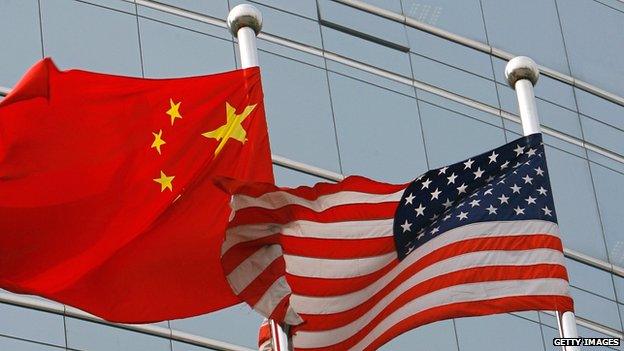China media: US-China dialogue
- Published

Media expect the annual US-China meeting to ease tensions between the two countries
Media hope that the annual US-China Strategic and Economic Dialogue will help "disperse suspicion" between the two countries as US Secretary of State John Kerry heads to Beijing for the talks.
Starting on Wednesday, the two-day key ministerial meeting is expected to dwell on issues that have strained bilateral relations, such as cyber-spying and maritime tensions in the Asia-Pacific.
Ruan Zongze, an expert on international relations at the China Institute of International Studies, tells the Beijing Times, external that the dialogue will encourage "confidence building" and help "dispel misunderstandings".
The pundit notes that this year marks the 35th anniversary of China-US diplomatic relations and that both countries could use the occasion to improve relations.
"China and the US have taken real action in order to show the world that their co-operation still has great potential. This dialogue will cover a wide range of topics, including future common plans that are of strategic importance to both countries," he adds.
China Net, external points out that the China-US relationship has gone through "ups and downs" over the past year and that this reflects a "strategic loss of trust". The website say the dialogue will "provide an opportunity to regain confidence" at a time when the Beijing-Washington relationship is "at its lowest point after the end of the Cold War".
"Japan, Philippines and Vietnam continue to provoke China, causing territorial disputes to escalate. The Obama administration has been blaming China for being aggressive. But to China, it the US that has deviated from its original neutral stance and adopted a biased policy which encourages more provocations," says China Net.
The China Daily, external writes that "despite all the troubles and obstacles and their mutual suspicion, China and the United States have managed to make the dialogue happen".
"The dialogue should strive to create an atmosphere conducive to dispelling misunderstandings. It would thus be of tremendous mutual benefit should the decision-makers of both countries take advantage of this opportunity and explain their positions. This is the only way to stop the downward spiral in their bilateral relations," says the daily.
Merkel visit
Media are optimistic, however, about the future of Beijing-Berlin ties as German Chancellor Angela Merkel wraps up her three-day visit to China.
Ji Mingkui, a professor at the National Defence University, thinks the relationship between the two countries is "full of dynamism".
"Mrs Merkel and German enterprises have built strong political and economic ties with China… China is very important to the German economy, and no other leader in Europe meets with Chinese leaders as frequently as she does," he writes in an article on the China Net, external website.
Several media outlets, external highlight Mrs Merkel's answers to questions about Germany's attitude towards World War Two asked during her visit to Beijing's Tsinghua University.
According to reports, she told Chinese students on Tuesday that Germany felt remorseful about the war. An article in the Beijing Times, external compares the position of Germany to that of Japan.
"Both Japan and Germany were aggressors… but in contrast to ties with Tokyo, Beijing and Berlin are now maintaining a good bilateral relationship… There is no doubt that the attitude towards history has become an important factor in China's diplomacy," writes the Beijing Times.
And finally, some media outlets warn that "free speech" could challenge the country's political system.
The Chinese edition of the Global Times, external reported on Tuesday that the microblogs and blogs of an outspoken political commentator, Li Chengpeng, had been suspended.
The article noted that Mr Li was originally a football commentator but became popular only after he began to "scold the government".
In its Wednesday editorial, external, the paper makes no mention of Mr Li but notes that "online confrontational criticism" has become popular and warns "radical liberals" to observe the "boundaries of free speech".
It points out that although freedom of speech in China has "expanded", criticism should only "aide the strengthening and the development of the country's political system, and not challenge it".
BBC Monitoring, external reports and analyses news from TV, radio, web and print media around the world. For more reports from BBC Monitoring, click here. You can follow BBC Monitoring on Twitter, external and Facebook, external.